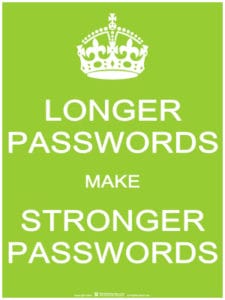How Much we Hate Passwords, but are Stuck till Something Better Comes Along
 It’s not news that everybody hates having to deal with passwords, and all the different and sometimes conflicting rules on how to use them. We here at Practical Help are no different – they’re darn inconvenient! Most of the people who ask us for help don’t even remember their own email passord – they’ve gotten their computer to remember it for them which is great until they have to get to their email another way. And as much as we hate them, we recognize how important they are in preventing identity theft.
It’s not news that everybody hates having to deal with passwords, and all the different and sometimes conflicting rules on how to use them. We here at Practical Help are no different – they’re darn inconvenient! Most of the people who ask us for help don’t even remember their own email passord – they’ve gotten their computer to remember it for them which is great until they have to get to their email another way. And as much as we hate them, we recognize how important they are in preventing identity theft.
We aren’t fans of programs that purport to help you manage your passwords, that’s just another thing to go wrong or for you to lose track of. In the past we’ve recommended you use mnemonics as a way to remember, and to use a limited number of passwords that you can memorize (but not just use one password for everything). We still recommend this.
Part of what makes passwords difficult is that each place you visit can (and often does) have differing requirements on what you can use in your password. Some allow spaces, some don’t. Some allow any type-able character on your keyboard, some restrict which ones you can use. Some restrict the number of characters you can use, some don’t. And so on.
So starting today, we’re slightly revising our password recommendation, read on for specific recommendations.
 We still think you should use one password for your email account, a different password for your online banking, credit card and other financial institution needs, a different one for online purchasing websites where you use your credit card and social networking, and one more for everything else. That’s only four passwords to memorize, and you should segregate your use of passwords by these categories.
We still think you should use one password for your email account, a different password for your online banking, credit card and other financial institution needs, a different one for online purchasing websites where you use your credit card and social networking, and one more for everything else. That’s only four passwords to memorize, and you should segregate your use of passwords by these categories.
 What’s different is in how you apply mnemonics and how to construct each password: come up with four, completely unrelated words in your native language. For example: rock, tangiers, brandy, fortress. Now construct for yourself a short story that uses those words in order. So following my example, how about “I threw a rock in Tangiers after drinking bad brandy, and they locked me up in a fortress”. You can do this backwards – write the little story first, then grab random words. Avoid the most common words and try to pick ones with at least four letters.
What’s different is in how you apply mnemonics and how to construct each password: come up with four, completely unrelated words in your native language. For example: rock, tangiers, brandy, fortress. Now construct for yourself a short story that uses those words in order. So following my example, how about “I threw a rock in Tangiers after drinking bad brandy, and they locked me up in a fortress”. You can do this backwards – write the little story first, then grab random words. Avoid the most common words and try to pick ones with at least four letters.
Ok, so now you’ve got your four ‘passphrases‘ – you should type the four words (no spaces) for each at least 10 times while reciting your little story. That’s usually enough to get them into long-term memory. Now you can start applying them. Just go to each website you visit, and change the existing password to the new one. Remember to use the right password for each type of use (email, banking, shopping/social, and everything else).
Lastly, if at any time you feel like any one of these passwords was compromised, just change that one by repeating the process of establishing and memorizing a new mnemonic, and changing all accounts in that type of use. Don’t wait for your identity to get stolen!
This website runs on a patronage model. If you find my answers of value, please consider supporting me by sending any dollar amount via:
or by mailing a check/cash to PosiTek.net LLC 1934 Old Gallows Road, Suite 350, Tysons Corner VA 22182. I am not a non-profit, but your support helps me to continue delivering advice and consumer technology support to the public. Thanks!






